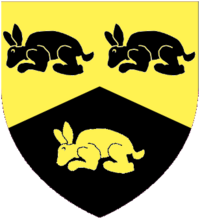Walter Cunliffe, 1st Baron Cunliffe facts for kids
Quick facts for kids
The Lord Cunliffe
|
|
|---|---|
| Governor of the Bank of England | |
| In office 1913–1918 |
|
| Preceded by | Alfred Clayton Cole |
| Succeeded by | Sir Brien Cokayne |
| Personal details | |
| Born |
Walter Cunliffe
3 December 1855 London, England |
| Died | 6 January 1920 (aged 64) Headley Court, Surrey, England |
| Profession | Banker |
Walter Cunliffe, 1st Baron Cunliffe (3 December 1855 – 6 January 1920) was an important British banker. He started his own banking business called Cunliffe Brothers. He is best known for being the Governor of the Bank of England from 1913 to 1918. This was a very important time because it was during World War I. In 1914, he was given the special title of 1st Baron Cunliffe.
He also led the Cunliffe Committee. This group created a plan in 1918 for how the country's money system should work after the war. This plan helped shape how the government managed its money.
Contents
Early Life and Family Background
Walter Cunliffe was born in London in 1855. He was one of six children. His father, Roger Cunliffe, was also a banker. He helped fund and build the North Eastern Railway (UK).
Walter went to school at Harrow School. He then studied at Trinity College, Cambridge. His brother, Alan Percy Cunliffe, owned land and racehorses.
A Career in Banking
Walter Cunliffe started working in banking in 1880. In 1890, he and two of his brothers, Arthur Robert and Leonard Daneham, started their own bank. It was called Cunliffe Brothers. Later, in 1920, this bank joined with another to become Goschens & Cunliffe.
Governor of the Bank of England
Cunliffe became a director at the Bank of England in 1895. He then became its Governor in 1913. He worked with important government officials called Chancellors of the Exchequer. These included David Lloyd George and Reginald McKenna.
When World War I began, he helped keep the money markets stable. He made sure that payments in gold continued. He also prevented foreign investments from being removed. In December 1914, he was given the title Baron Cunliffe. In 1917, he was part of a group called the Balfour Mission. This group worked to improve cooperation with the United States during the war.
Cunliffe received a high honor in June 1917. He was made a Knight Grand Cross of the Order of the British Empire. Later that year, he had disagreements with the government. He felt the Treasury was too involved in keeping the pound sterling's value stable. He retired from his role as Governor in March 1918.
Workplace Rules and Style
As Governor, Walter Cunliffe wrote some of the first rules for how women should dress at work. He wanted them to wear "absolutely white" blouses without patterns in summer.
He also served as a director for other companies. These included the North Eastern Railway (UK) and the P. & O. Line. He received awards from other countries too. These included the Commander of the Légion d'honneur from France. He also received the Grand Cordon of the Order of the Rising Sun from Japan.
Walter Cunliffe was known for having strong opinions. He sometimes had disagreements with government officials. Despite this, he was a very important figure in British finance during a challenging time.
The Cunliffe Committee Report
As Governor, Cunliffe led a group called the Cunliffe Committee. Their job was to suggest how the British economy should transition after the war. In 1918, the committee recommended that the country should quickly return to the gold standard. This meant that the value of money would be directly linked to gold.
Before this committee, Cunliffe had expressed doubts about the ideas of a young economist named John Maynard Keynes. He believed Keynes lacked practical experience in business.
Personal Life and Family
In 1880, Walter Cunliffe received the Headley Court estate from his father. This was on the condition that he would pursue a career in banking. He rebuilt the main house on the estate in 1898.
Walter Cunliffe married Mary Agnes in 1890. She passed away in 1893. He then married Edith Cunningham in 1896. They had three sons and three daughters. One of his sons, Geoffrey, married the actress Barbara Waring.
Walter Cunliffe died at his home, Headley Court, on January 6, 1920. He was 64 years old. His son, Rolf, inherited his title.
Arms
|
 | Dorothy Vaughan |
 | Charles Henry Turner |
 | Hildrus Poindexter |
 | Henry Cecil McBay |



